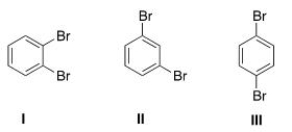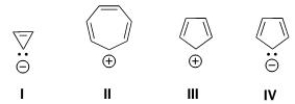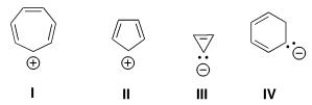Deck 17: Benzene and Aromatic Compounds
Question
Question
Question
Question
Question
Question
Question
Question
Question
Question
Question
Question
Question
Question
Question
Question
Question
Question
Question
Question
Question
Question
Question
Question
Question
Question
Question
Question
Question
Question
Question

Unlock Deck
Sign up to unlock the cards in this deck!
Unlock Deck
Unlock Deck
1/31
Play
Full screen (f)
Deck 17: Benzene and Aromatic Compounds
1
What is the IUPAC name of the following compound?

A)3,6-Dichloroaniline
B)2,5-Dichloroaniline
C)2,5-Dichloroaminobenzene
D)2,5-Dichloroanisole

A)3,6-Dichloroaniline
B)2,5-Dichloroaniline
C)2,5-Dichloroaminobenzene
D)2,5-Dichloroanisole
2,5-Dichloroaniline
2
What is the structure of a compound of molecular formula C10H14O2 that shows a strong IR absorption at 3150 ¾2850 cm-1 and gives the following 1H NMR absorptions: 1.4 (triplet, 6H); 4.0 (quartet, 4H); and 6.8 (singlet, 4H) ppm?

A)I
B)II
C)III
D)IV

A)I
B)II
C)III
D)IV
IV
3
What is the correct assignment of the number of signals in the 13C NMR spectra of the following disubstituted benzene derivatives?

A)I = 3 signals; II = 3 signals; III = 2 signals.
B)I = 3 signals; II = 4 signals; III = 2 signals.
C)I = 6 signals; II = 6 signals; III = 6 signals.
D)I = 3 signals; II = 4 signals; III = 3 signals.

A)I = 3 signals; II = 3 signals; III = 2 signals.
B)I = 3 signals; II = 4 signals; III = 2 signals.
C)I = 6 signals; II = 6 signals; III = 6 signals.
D)I = 3 signals; II = 4 signals; III = 3 signals.
I = 3 signals; II = 4 signals; III = 2 signals.
4
What orbitals are used to form the indicated bond?

A)sp3
B)sp2
C)p
D)sp3 and sp2

A)sp3
B)sp2
C)p
D)sp3 and sp2

Unlock Deck
Unlock for access to all 31 flashcards in this deck.
Unlock Deck
k this deck
5
Which of the following ions is aromatic?

A)Only I and II
B)Only II and III
C)Only III and IV
D)Only II and IV

A)Only I and II
B)Only II and III
C)Only III and IV
D)Only II and IV

Unlock Deck
Unlock for access to all 31 flashcards in this deck.
Unlock Deck
k this deck
6
Which of the following statements about the structure of benzene is not true?
A)Benzene is planar.
B)Benzene has three short double bonds alternating with three longer single bonds.
C)The electrons in the pi bonds are delocalized around the ring.
D)Benzene has six pi electrons.
A)Benzene is planar.
B)Benzene has three short double bonds alternating with three longer single bonds.
C)The electrons in the pi bonds are delocalized around the ring.
D)Benzene has six pi electrons.

Unlock Deck
Unlock for access to all 31 flashcards in this deck.
Unlock Deck
k this deck
7
Which of the following statements about benzene is true?
A)Benzene is a saturated hydrocarbon.
B)Benzene undergoes addition reactions.
C)Benzene has five degrees of unsaturation.
D)Benzene undergoes substitution reactions.
A)Benzene is a saturated hydrocarbon.
B)Benzene undergoes addition reactions.
C)Benzene has five degrees of unsaturation.
D)Benzene undergoes substitution reactions.

Unlock Deck
Unlock for access to all 31 flashcards in this deck.
Unlock Deck
k this deck
8
What is the name of the following compound?

A)Meta-bromophenol
B)Para-hydroxybenzene
C)3-bromoanisole
D)6-methoxy-2-bromobenzene

A)Meta-bromophenol
B)Para-hydroxybenzene
C)3-bromoanisole
D)6-methoxy-2-bromobenzene

Unlock Deck
Unlock for access to all 31 flashcards in this deck.
Unlock Deck
k this deck
9
How many 13CNMR signals does the following compound exhibit?

A)4
B)5
C)6
D)8

A)4
B)5
C)6
D)8

Unlock Deck
Unlock for access to all 31 flashcards in this deck.
Unlock Deck
k this deck
10
What is the correct assignment of the names of the following aromatic heterocycles?

A)I = pyridine; II = pyrimidine; III = furan.
B)I = pyrimidine; II =pyrrole; III = furan.
C)I = pyridine; II = pyrrole; III = furan.
D)I = pyrimidine; II = pyrrole; III = tetrahydrofuran.

A)I = pyridine; II = pyrimidine; III = furan.
B)I = pyrimidine; II =pyrrole; III = furan.
C)I = pyridine; II = pyrrole; III = furan.
D)I = pyrimidine; II = pyrrole; III = tetrahydrofuran.

Unlock Deck
Unlock for access to all 31 flashcards in this deck.
Unlock Deck
k this deck
11
What is the name of the following compound?

A)2,6-Dimethylbenzene
B)5-Methyltoluene
C)Anisole
D)1,3-Dimethylbenzene

A)2,6-Dimethylbenzene
B)5-Methyltoluene
C)Anisole
D)1,3-Dimethylbenzene

Unlock Deck
Unlock for access to all 31 flashcards in this deck.
Unlock Deck
k this deck
12
Which of the following ions is aromatic?

A)I
B)II
C)III
D)IV

A)I
B)II
C)III
D)IV

Unlock Deck
Unlock for access to all 31 flashcards in this deck.
Unlock Deck
k this deck
13
Rank the following compounds in order of decreasing acidity, starting with the most acidic. 
A)I > II > III
B)III > II > I
C)III > I > II
D)I > III > II

A)I > II > III
B)III > II > I
C)III > I > II
D)I > III > II

Unlock Deck
Unlock for access to all 31 flashcards in this deck.
Unlock Deck
k this deck
14
Which of the following is not one of the Hückel's criteria for aromaticity?
A)The molecule must be cyclic.
B)The molecule must be planar.
C)The molecule must be completely conjugated.
D)The molecule must have 4n pi electrons.
A)The molecule must be cyclic.
B)The molecule must be planar.
C)The molecule must be completely conjugated.
D)The molecule must have 4n pi electrons.

Unlock Deck
Unlock for access to all 31 flashcards in this deck.
Unlock Deck
k this deck
15
What is the IUPAC name of the following compound?

A)1-Chloro-4-ethyl-3-propylbenzene
B)1-Chloro-4-ethyl-5-propylbenzene
C)4-Chloro-1-ethyl-2-propylbenzene
D)4-Chloro-2-propyltoluene

A)1-Chloro-4-ethyl-3-propylbenzene
B)1-Chloro-4-ethyl-5-propylbenzene
C)4-Chloro-1-ethyl-2-propylbenzene
D)4-Chloro-2-propyltoluene

Unlock Deck
Unlock for access to all 31 flashcards in this deck.
Unlock Deck
k this deck
16
Which of the following is not a criterion for antiaromaticity?
A)The molecule must be cyclic.
B)The molecule must have (4n + 2) pi electrons.
C)The molecule must be planar.
D)The molecule must be completely conjugated.
A)The molecule must be cyclic.
B)The molecule must have (4n + 2) pi electrons.
C)The molecule must be planar.
D)The molecule must be completely conjugated.

Unlock Deck
Unlock for access to all 31 flashcards in this deck.
Unlock Deck
k this deck
17
What is the correct assignment of the names of the following substituted benzenes?

A)I = Phenol; II = anisole; III = toluene.
B)I = Benzaldehyde; II = phenol; III = anisole.
C)I = Benzaldehyde; II = phenol; III = toluene.
D)I = Phenol; II = anisole; III = styrene.

A)I = Phenol; II = anisole; III = toluene.
B)I = Benzaldehyde; II = phenol; III = anisole.
C)I = Benzaldehyde; II = phenol; III = toluene.
D)I = Phenol; II = anisole; III = styrene.

Unlock Deck
Unlock for access to all 31 flashcards in this deck.
Unlock Deck
k this deck
18
What orbitals are used to form the indicated bond?

A)sp3
B)sp2
C)p
D)sp3 and sp2

A)sp3
B)sp2
C)p
D)sp3 and sp2

Unlock Deck
Unlock for access to all 31 flashcards in this deck.
Unlock Deck
k this deck
19
Which of the following molecules has the most acidic hydrogen atoms?

A)I
B)II
C)III
D)IV

A)I
B)II
C)III
D)IV

Unlock Deck
Unlock for access to all 31 flashcards in this deck.
Unlock Deck
k this deck
20
Which of the following heterocycles is not aromatic?

A)I
B)II
C)III
D)IV

A)I
B)II
C)III
D)IV

Unlock Deck
Unlock for access to all 31 flashcards in this deck.
Unlock Deck
k this deck
21
What is the correct structure for aniline?

A)I
B)II
C)III
D)IV

A)I
B)II
C)III
D)IV

Unlock Deck
Unlock for access to all 31 flashcards in this deck.
Unlock Deck
k this deck
22
What is the correct structure for toluene?

A)I
B)II
C)III
D)IV

A)I
B)II
C)III
D)IV

Unlock Deck
Unlock for access to all 31 flashcards in this deck.
Unlock Deck
k this deck
23
Which of the following compounds is not aromatic?

A)I
B)II
C)III
D)IV

A)I
B)II
C)III
D)IV

Unlock Deck
Unlock for access to all 31 flashcards in this deck.
Unlock Deck
k this deck
24
Which of the following compounds is not aromatic?

A)I
B)II
C)III
D)IV

A)I
B)II
C)III
D)IV

Unlock Deck
Unlock for access to all 31 flashcards in this deck.
Unlock Deck
k this deck
25
Where do the protons in benzene appear in the 1H NMR spectrum?
A)Around 1600 cm-1
B)Around 120 ppm
C)Around 0 ppm
D)Around 7 ppm
A)Around 1600 cm-1
B)Around 120 ppm
C)Around 0 ppm
D)Around 7 ppm

Unlock Deck
Unlock for access to all 31 flashcards in this deck.
Unlock Deck
k this deck
26
Which of the following compounds is aromatic?

A)I
B)II
C)III
D)IV

A)I
B)II
C)III
D)IV

Unlock Deck
Unlock for access to all 31 flashcards in this deck.
Unlock Deck
k this deck
27
Why is the following compound not aromatic?

A)It has 4n pi electrons.
B)It is not cyclic.
C)It has 4n+2 pi electrons.
D)The p electron system is not continuous.

A)It has 4n pi electrons.
B)It is not cyclic.
C)It has 4n+2 pi electrons.
D)The p electron system is not continuous.

Unlock Deck
Unlock for access to all 31 flashcards in this deck.
Unlock Deck
k this deck
28
What is the correct structure for anisole?

A)I
B)II
C)III
D)IV

A)I
B)II
C)III
D)IV

Unlock Deck
Unlock for access to all 31 flashcards in this deck.
Unlock Deck
k this deck
29
Why is the following compound not aromatic?

A)It has 4n electrons.
B)It is not cyclic.
C)It has 4n+2 electrons.
D)The p electron system is not continuous.

A)It has 4n electrons.
B)It is not cyclic.
C)It has 4n+2 electrons.
D)The p electron system is not continuous.

Unlock Deck
Unlock for access to all 31 flashcards in this deck.
Unlock Deck
k this deck
30
What is the correct structure for 1-bromo-2,4-dimethoxybenzene?

A)I
B)II
C)III
D)IV

A)I
B)II
C)III
D)IV

Unlock Deck
Unlock for access to all 31 flashcards in this deck.
Unlock Deck
k this deck
31
Which of the following compounds is aromatic?

A)I
B)II
C)III
D)IV

A)I
B)II
C)III
D)IV

Unlock Deck
Unlock for access to all 31 flashcards in this deck.
Unlock Deck
k this deck



